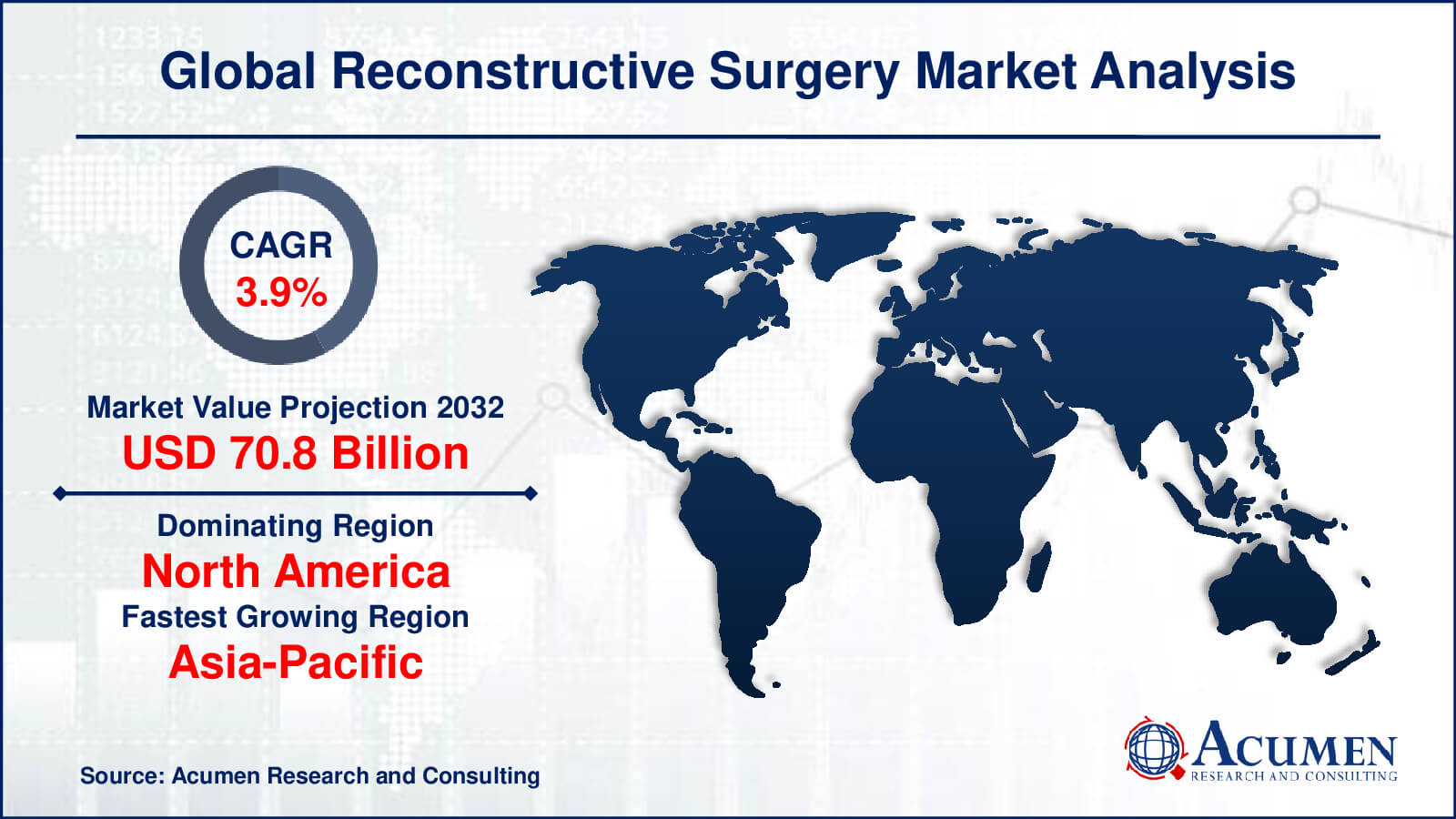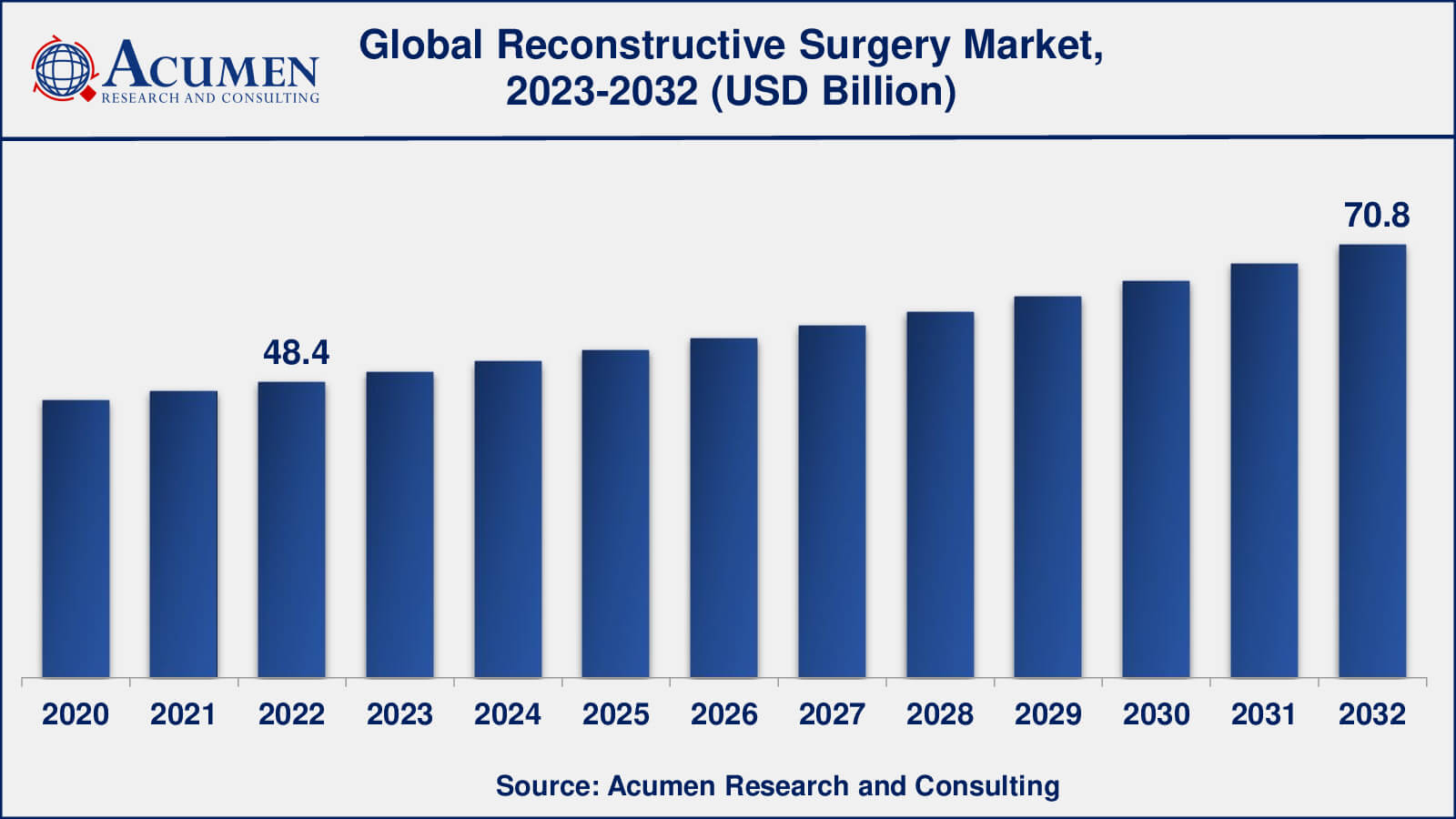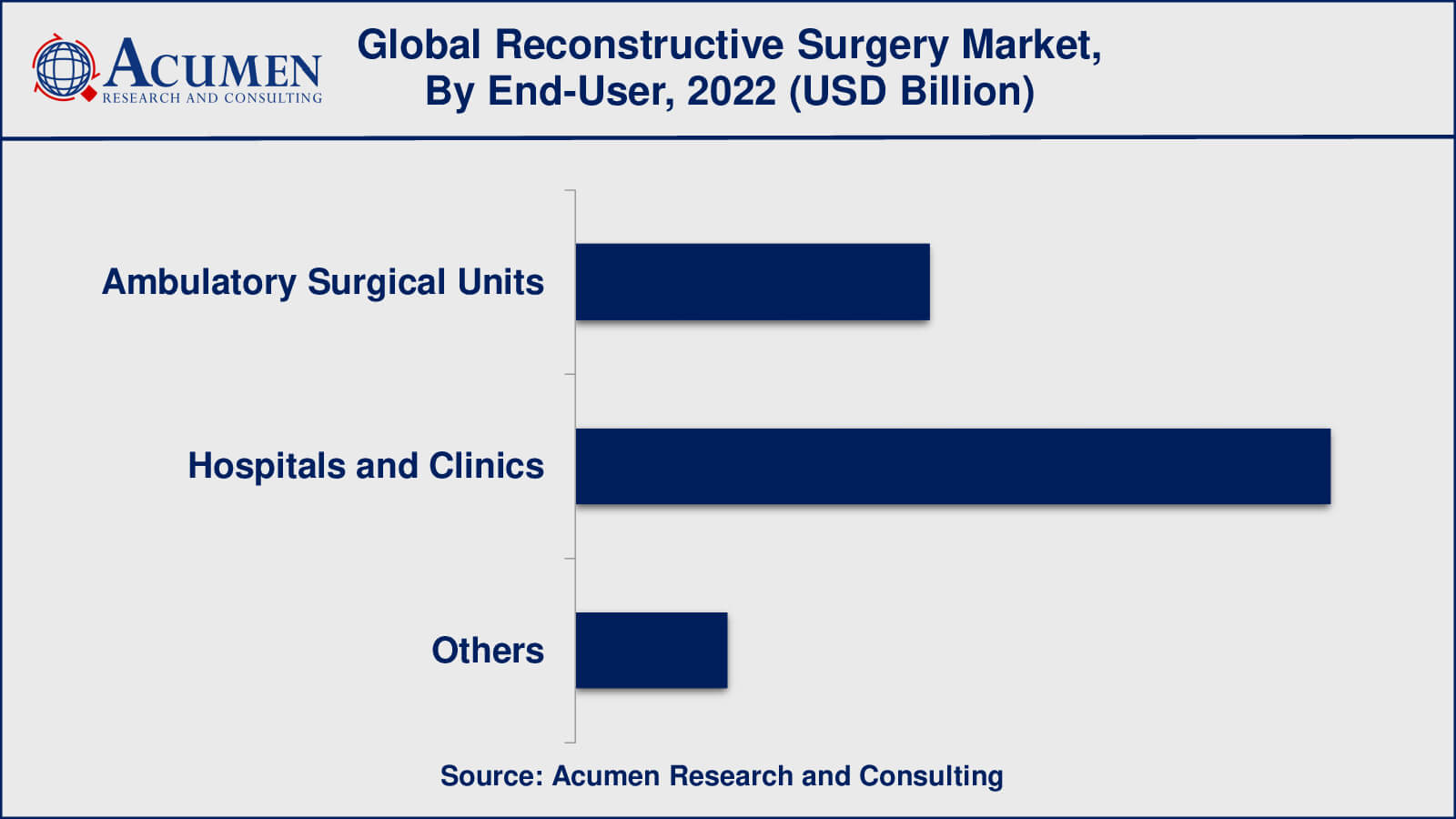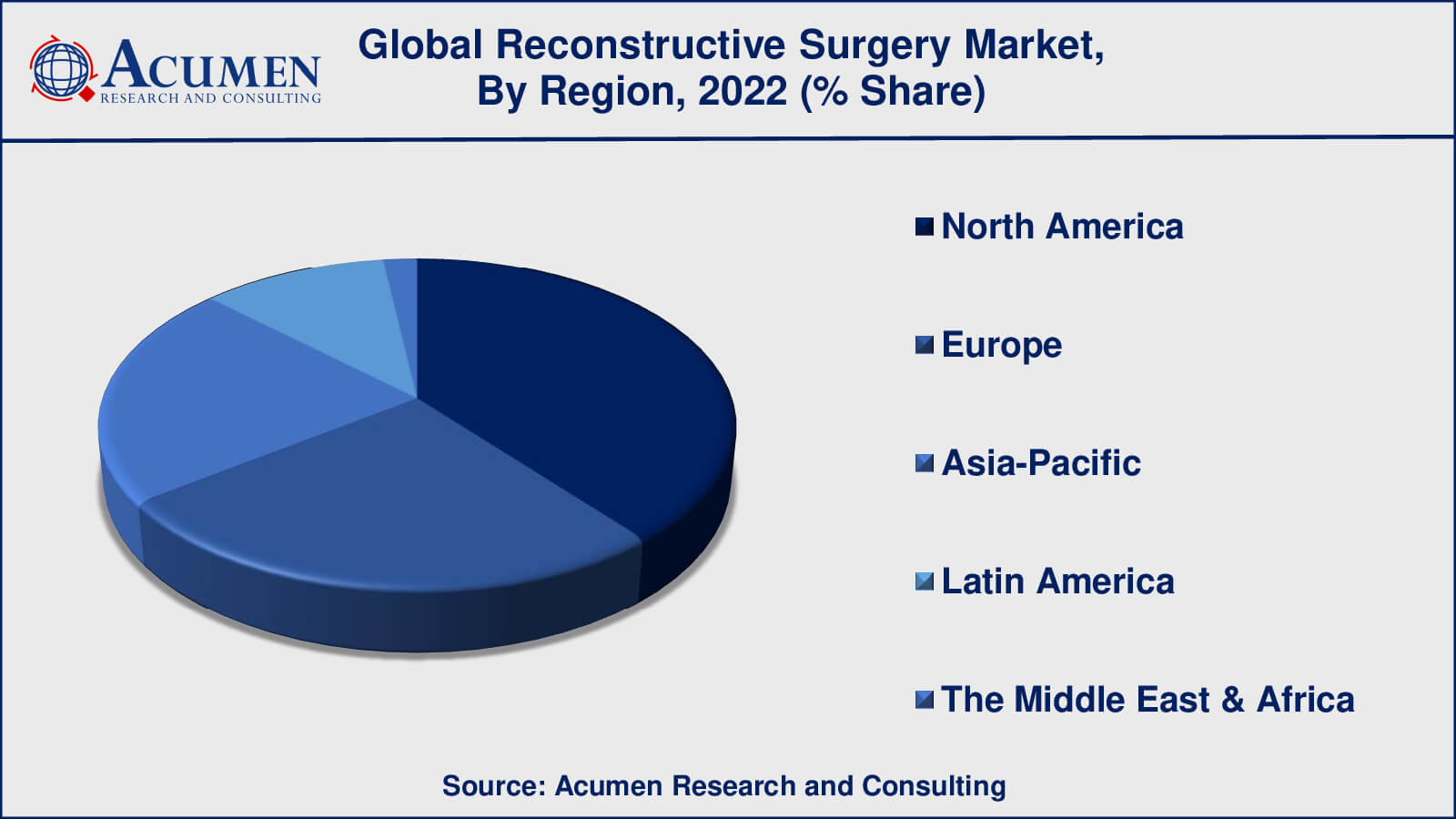Reconstructive Surgery Market Size - Global Industry, Share, Analysis, Trends and Forecast 2023 - 2032
Published :
Report ID:
Pages :
Format :
Reconstructive Surgery Market Size - Global Industry, Share, Analysis, Trends and Forecast 2023 - 2032
Report Coverage
- Industry Dynamics
- Market Size and Forecast Data
- Segment Analysis
- Competitive Landscape
- Regional Analysis with a Niche Focus on Country-Level Data
- High Level Analysis - Porter's, PESTEL, Value Chain, etc.
- Company Profiles of Key Players
- Option to Customize the Report As Per Your Specific Need
Request Sample Report
The Global Reconstructive Surgery Market Size accounted for USD 48.4 Billion in 2022 and is estimated to achieve a market size of USD 70.8 Billion by 2032 growing at a CAGR of 3.9% from 2023 to 2032.
Reconstructive Surgery Market Highlights
- Global reconstructive surgery market revenue is poised to garner USD 70.8 billion by 2032 with a CAGR of 3.9% from 2023 to 2032
- According to global estimates, approximately 313 million cosmetic surgeries are performed annually
- North America reconstructive surgery market value occupied around USD 19 billion in 2022
- According to International Society of Aesthetic Plastic Surgery (ISAPS), over 1.9 million liposuction surgical procedures were performed in 2021
- Asia-Pacific reconstructive surgery market growth will record a CAGR of more than 4% from 2023 to 2032
- Among indication, the breast reconstruction sub-segment generated over US$ 14.5 billion revenue in 2022
- Based on end-user, the hospitals sub-segment generated around 60% share in 2022
- Growing trend of medical tourism is a popular reconstructive surgery market trend that fuels the industry demand

Reconstructive surgery is a type of surgical procedure used to repair or reconstruct damaged or abnormal body structures. This can involve restoring a body part's function, improving its appearance, or both. Reconstructive surgery can be done on various body parts, including the face, hands, breasts, and other areas. Repairing defects caused by injury or disease, correcting birth defects, improving function or appearance following cancer treatment, and repairing damage caused by previous surgery are some of the most common reasons for reconstructive surgery. Breast reconstruction following a mastectomy, facial reconstruction following trauma or injury, hand surgery to improve function following an injury, and skin grafting to repair burns or other injuries are examples of reconstructive surgeries.

Global Reconstructive Surgery Market Dynamics
Market Drivers
- Increasing prevalence of chronic diseases
- Growing demand for cosmetic surgery
- Technological advancements in reconstructive surgery
- Rising healthcare expenditure in developing countries
- Favorable reimbursement policies
Market Restraints
- High cost of reconstructive surgery procedures
- Stringent regulatory requirements for product approval
- Lack of skilled professionals
- Adverse effects associated with reconstructive surgery procedures
Market Opportunities
- Rising awareness about reconstructive surgery in emerging economies
- Development of customized and personalized reconstructive surgery solutions
- Increasing adoption of minimally invasive techniques in reconstructive surgery
Reconstructive Surgery Market Report Coverage
| Market | Reconstructive Surgery Market |
| Reconstructive Surgery Market Size 2022 | USD 48.4 Billion |
| Reconstructive Surgery Market Forecast 2032 | USD 70.8 Billion |
| Reconstructive Surgery Market CAGR During 2023 - 2032 | 3.9% |
| Reconstructive Surgery Market Analysis Period | 2020 - 2032 |
| Reconstructive Surgery Market Base Year | 2022 |
| Reconstructive Surgery Market Forecast Data | 2023 - 2032 |
| Segments Covered | By Product, By Prosthetic Implant, By End-User, And By Geography |
| Regional Scope | North America, Europe, Asia Pacific, Latin America, and Middle East & Africa |
| Key Companies Profiled | Accurate Surgical & Scientific Instruments Corporation, B. Braun Melsungen AG, Baxter, Medtronic, Fresenius Medical Care, General Electric, Integra LifeSciences, Johnson & Johnson Private Limited, KLS Martin Group, Koninklijke Philips N.V., Siemens, Tekno-Medical Optik-Chirurgie GmbH, and Zimmer Biomet. |
| Report Coverage |
Market Trends, Drivers, Restraints, Competitive Analysis, Player Profiling, Covid-19 Analysis, Regulation Analysis |
Reconstructive Surgery Market Insights
Reconstructive surgery is an important medical specialty that focuses on repairing or reconstructing damaged or abnormal body structures. It is a growing market driven by a variety of factors, including growing demand for cosmetic surgery, increasing prevalence of chronic diseases, rising healthcare expenditure in developing countries, and technological advancements in reconstructive surgery. However, the market also continues to face, such as high costs, stringent regulatory requirements, and negative side effects associated with reconstructive surgery procedures.
The rising prevalence of chronic diseases, such as cancer, which can necessitate reconstructive surgery procedures, is one of the key drivers of the reconstructive surgery market. With an ageing population, the prevalence of chronic diseases is expected to rise, increasing demand for reconstructive surgery.
Furthermore, the growing demand for cosmetic surgery is a major driver of the reconstructive surgery market. Cosmetic surgery has grown in popularity in recent years as more people seek to improve their appearance through surgery. The market for cosmetic surgery is expected to expand further, owing to factors such as changing social attitudes, rising disposable income, and advances in surgical techniques.
Technological advancements in reconstructive surgery are also propelling market growth. These advancements have resulted in the development of new goods and methods that are less invasive, more effective, and require less recovery time. For example, 3D printing has enabled the creation of customized implants that perfectly fit a patient's body, while advances in robotics have made surgery less invasive and more precise.
However, the industry also faces challenges, such as the high cost of reconstructive surgery procedures, which can restrict access for some patients. Furthermore, stringent regulatory prerequisites for product approval can make it difficult for businesses to introduce new products to the market. There is also a shortage of skilled professionals in some areas, which can limit the availability of reconstructive surgery services.
Reconstructive Surgery Market Segmentation
The worldwide market for reconstructive surgery is split based on product, prosthetic implant, end-user, and geography.
Reconstructive Surgery Products
- Breast Reconstruction
- Congenital Anomalies
- Hand Surgery
- Lymphedema Treatment
- Orthognathic Surgeries
- Septoplasty
- Skin Cancer
- Tissue Expansion
- Others
According to the reconstructive surgery industry analysis, breast reconstruction surgery is one of the most important segments of the reconstructive surgery market, with breast implants being a key product used in this procedure. Orthopedic surgery, which uses implants and other devices to repair or replace broken bones and joints, and facial surgery, which includes procedures like orthognathic surgery and septoplasty, are two other significant market segments.
The product and procedure used in reconstructive surgery are determined by the specific condition being treated and the patient's needs. As a result, companies in the reconstructive surgery market typically provide a variety of products and solutions to meet various needs, and the market is distinguished by a high level of specialisation and innovation. As new technologies and techniques emerge, the market is expected to evolve and expand, with new products as well as procedures being developed to address a variety of medical conditions and patient needs.
Reconstructive Surgery Prosthetic Implants
- Implants
- Rings
- Stents
- Tubes
- Others
According to our analysis, tubes are the prosthetic implants with the largest market share. Tubes include items such as tracheal tubes and esophageal tubes, which are used to provide a clear passage for air or food, respectively. Rings are typically used to support structures like the trachea and bronchi to prevent them from collapsing. Stents are used to keep blood vessels or other tubular structures open and can be used in procedures such as angioplasty or tracheal dilation. Implants include a variety of devices that are used to replace or support damaged or missing tissue, such as hip and knee replacements, dental implants, and breast implants. Furthermore, tissue expanders, bone grafts, and facial implants are just a few of the many other products used in reconstructive surgery.
Reconstructive Surgery End-Users
- Ambulatory Surgical Units
- Hospitals and Clinics
- Others

According to reconstructive surgery market forecasts, hospitals are the primary location for even more complex and serious surgical procedures, including many types of reconstructive surgery. Hospitals typically have specialised departments or units for reconstructive surgery, and they may provide a variety of services such as pre-operative assessments, post-operative care, and rehabilitation. Ambulatory surgical units are specialised medical facilities that offer same-day surgical procedures without the need for an overnight stay. They are frequently used for procedures that do not require hospitalisation or extensive recovery time, such as cosmetic surgery or minor reconstructive procedures. Clinics may be smaller and more specialised than hospitals, but they still offer a variety of surgical and medical services, including reconstructive surgery. Some clinics may specialise in specific types of reconstructive procedures, such as plastic surgery or dental implants.
Reconstructive Surgery Market Regional Outlook
- U.S.
- Canada
Europe
- U.K.
- Germany
- France
- Spain
- Rest of Europe
Asia-Pacific
- India
- Japan
- China
- Australia
- South Korea
- Rest of Asia-Pacific
Latin America
- Brazil
- Mexico
- Rest of Latin America
The Middle East & Africa
- South Africa
- GCC Countries
- Rest of the Middle East & Africa (ME&A)

Reconstructive Surgery Market Regional Analysis
The North American market for reconstructive surgery is the world's largest, driven by high levels of healthcare spending and the presence of leading medical device companies. The United States is the largest market in the region, accounting for a sizable portion of global demand.
The European market for reconstructive surgery is also significant, owing to a large and ageing population, high levels of healthcare expenditure, and advanced medical infrastructure. The market is divided among several countries, with Germany, France, and the United Kingdom being the largest.
The Asia-Pacific region is a rapidly growing market for reconstructive surgery, driven by rising demand for advanced medical services as well as a large and growing population. China and India are among the biggest markets in the region, and they are expected to continue growing in the years to come.
Reconstructive Surgery Market Players
Some of the top Reconstructive Surgery companies offered in the professional report include Accurate Surgical & Scientific Instruments Corporation, B. Braun Melsungen AG, Baxter, Medtronic, Fresenius Medical Care, General Electric, Integra LifeSciences, Johnson & Johnson Private Limited, KLS Martin Group, Koninklijke Philips N.V., Siemens, Tekno-Medical Optik-Chirurgie GmbH, and Zimmer Biomet.
In 2021, Fresenius Medical Care will launch its new 6008 CARE system for hemodialysis, which has advanced features for improved safety and efficiency.
In 2021, General Electric will launch its new Discovery XR656 Plus digital radiography system, which offers additional features for improved image quality and patient comfort.
Integra LifeSciences will launch its new Titan Reverse Shoulder System in 2021, with advanced features for enhanced range of motion and stability in shoulder replacement procedures.
Frequently Asked Questions
What was the market size of the global reconstructive surgery in 2022?
The market size of reconstructive surgery was USD 48.4 billion in 2022.
What is the CAGR of the global reconstructive surgery market from 2023 to 2032?
The CAGR of reconstructive surgery is 3.9% during the analysis period of 2023 to 2032.
Which are the key players in the reconstructive surgery market?
The key players operating in the global market are including Accurate Surgical & Scientific Instruments Corporation, B. Braun Melsungen AG, Baxter, Medtronic, Fresenius Medical Care, General Electric, Integra LifeSciences, Johnson & Johnson Private Limited, KLS Martin Group, Koninklijke Philips N.V., Siemens, Tekno-Medical Optik-Chirurgie GmbH, and Zimmer Biomet.
Which region dominated the global reconstructive surgery market share?
North America held the dominating position in reconstructive surgery industry during the analysis period of 2023 to 2032.
Which region registered fastest CAGR from 2023 to 2032?
Asia-Pacific region exhibited fastest growing CAGR for market of reconstructive surgery during the analysis period of 2023 to 2032.
What are the current trends and dynamics in the global reconstructive surgery industry?
The current trends and dynamics in the reconstructive surgery industry include increasing prevalence of chronic diseases, growing demand for cosmetic surgery, technological advancements in reconstructive surgery, and rising healthcare expenditure in developing countries.
Which product held the maximum share in 2022?
The breast reconstruction held the maximum share of the reconstructive surgery industry.



